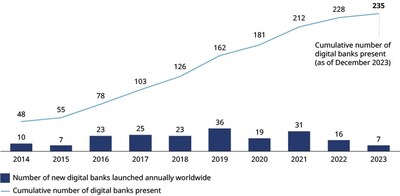New Report by WeBank and Oliver Wyman Reveals Development and Innovation Trends of Global Digital Banks
Rhea-AI Summary
WeBank and Oliver Wyman have released a report on global digital banking trends. Key findings include:
- By end of 2023, there were 235 licensed digital banks globally, with over 300 offering broader digital banking services
- Digital banks are exploring sustainable business models, diversified revenue streams, ecosystem resources, multi-market operations, and technological innovation
- Two effective business models have emerged: retail-driven for large populations and niche-focused for smaller markets
- Digital banks are leveraging unique ecosystem resources and expanding across multiple markets
- They play a important role in data infrastructure development and industry innovation
- Digital banks are now seen as 'catfish' promoting healthy competition rather than disruptors
- Leading digital banks have achieved economies of scale and strong profitability
The report predicts widening gaps between industry leaders and followers, with potential for establishing industry standards.
Positive
- Global count of licensed digital banks reached 235 by end of 2023
- Many leading digital banks have achieved commercial success in terms of business scale and profitability
- Digital banks are exploring sustainable business models and diversified revenue streams
- Some digital banks have developed their own super applications integrating financial services
- Digital banks are facilitating the development of data infrastructure and driving industry innovation
- Leading digital banks have reached economies of scale and strong profitability
Negative
- Gaps between leaders and followers are expected to widen in terms of profitability, market coverage, and influence
- Chinese digital banks will face increasing challenges as global peers accelerate their growth
News Market Reaction
On the day this news was published, MMC declined 0.04%, reflecting a mild negative market reaction.
Data tracked by StockTitan Argus on the day of publication.
According to the report, the number of digital banks has significantly increased over the past decade, driven by technological advancements and the need for financial inclusion. By the end of 2023, the global count of licensed digital banks had reached 235, while the number of players offering broader digital banking services had already exceeded 300. Among them, many leading global players have achieved commercial success in terms of business scale and profitability, thereby driving innovation and fostering a more dynamic financial services industry.
Exhibit 1: Number of licensed digital banks worldwide
2014 - 2023
Note: Only includes institutions that have obtained banking licenses from national regulatory authorities or have special "virtual bank" licenses
Source: The respective financial regulators of various countries and regions
THE DEVELOPMENT OF GLOBAL DIGITAL BANKS REVEALS COMMONALITIES
Digital banks started to emerge worldwide between 2009 and 2014. With fintech advancements and regulatory support, digital banking initially developed in
The development of digital banks worldwide varies significantly due to the different circumstances of their home markets, resource endowments, and business choices. The report highlights that in recent years, global digital banks have been exploring sustainable business models, diversified business lines, unique ecosystem resources, multi-market operations, and innovation in technological and data infrastructure. According to the report, these five themes are key factors that will widen the gap between industry leaders and followers.
Global digital banks strive to establish sustainable business models and diversify their revenue streams to meet the unique needs of their customers. Currently, there are two types of business models that have proven to be commercially effective. In markets with large populations, digital banks typically adopt a retail-driven model, focusing on serving a broad customer base. As digital banks acquire a significant user base, they can leverage technology to enhance operational efficiency and thus increase profitability. In markets with smaller populations, digital banks tend to concentrate on specific niche customer groups or sectors with high potential returns, such as small and medium enterprises (SMEs) and the auto financing sector.
These models enable digital banks to navigate diverse market environments, enhance customer experience, and improve operational efficiency through innovation and technology.
Furthermore, many digital banks have been exploring diversified revenue streams. They offer Banking-as-a-Service solutions, monetize their in-house technological capabilities, and provide non-financial services to SMEs. These initiatives have contributed to improved profitability and enhanced valuation for digital banks in the capital markets.
Global digital banks have been capitalizing on the unique resources within their ecosystems and expanding their operations across multiple markets. By embedding their services within a specific ecosystem, digital banks can offer customers seamless user experience. Additionally, they can leverage alternative data within the ecosystem to enhance customer acquisition, product pricing, and risk management while ensuring compliance.
Digital banks, with diverse backgrounds and available resources, employ different strategies when leveraging their respective ecosystems. Some digital banks develop their own super applications that integrate their financial services, creating an ecosystem that offers comprehensive solutions for customers. On the other hand, digital banks that have transformed from traditional banks aim to capitalize on the resources accumulated by the incumbents. They collaborate with external partners and share ecosystem resources to enhance their offerings.
Global digital banks are dedicated to facilitating the development of data infrastructure and driving industry innovation. They not only play a crucial role in the circulation of data but also act as facilitators and promoters, driving the circulation and sharing of data elements to build a robust data ecosystem. By actively participating in the circulation and sharing of data, digital banks can fuel their own growth and have a broader positive impact on the development of financial infrastructure.
DIGITAL BANKS WILL CONTINUE TO DRIVE INNOVATION AND COMPETITION IN THE FINANCIAL SERVICES INDUSTRY
When digital banks first emerged, they were often perceived as "challengers" or "disruptors" in the banking industry. However, as their business models prove to be effective and regulations mature, digital banks are now being seen as "catfish" for healthy competition instead. They are being introduced into the local banking system to motivate incumbents and improve the overall performance of the industry.
Leading digital banks have already reached economies of scale and strong profitability, according to the report. In the coming years, gaps between leaders and followers are expected to widen in terms of profitability, market coverage, and influence over industry standards, which may be gradually established. The technical standards and risk management models of leading players could be adopted as common industry standards, promoting the consistency and overall development of the digital banking sector.
As a result, there will be different challenges for digital banks worldwide. For Chinese digital banks, they will face increasing challenges as global peers accelerate their own growth. The next focus for Chinese digital banks will be addressing the challenges posed by new technologies, new standards, and new models from digital banks in other regions, as well as expanding their services to a broader market.
Arthur Wang, Chief Financial Officer and Secretary of the Board of Directors of WeBank, said: "As the first digital bank in
Hang Qian, Partner and the Head of Oliver Wyman's Financial Services Greater China added: "As technologies such as artificial intelligence, Web 3.0, the Internet of Things, and the metaverse continue to advance, the digital banking industry will witness ongoing innovation in applications, products, and services. The emergence of new technologies will further drive the evolution of digital banks' structure and operations, ultimately increasing the industry's overall value. The boundaries between traditional and digital banks will gradually blur as these innovations reshape the global banking industry, bringing new momentum to its development and transformation."
About WeBank
Launched in 2014, WeBank Co., Ltd. ("WeBank") is the first digital bank in China. WeBank provides convenient financial services to micro-, small- and medium-sized enterprises (MSMEs) and the public, and continuously improves the quality of services in response to customers' specific needs. WeBank now ranks 255 in the Top 1000 World Banks by The Banker.
WeBank focuses on innovation and technology. WeBank has maintained its proportion of technical personnel above
About Oliver Wyman
Oliver Wyman, a business of Marsh McLennan (NYSE: MMC), is a management consulting firm combining deep industry knowledge with specialized expertise to help clients optimize their business, improve operations and accelerate performance. Marsh McLennan is a global leader in risk, strategy and people, advising clients in 130 countries across four businesses: Marsh, Guy Carpenter, Mercer and Oliver Wyman. With annual revenue of
![]() View original content to download multimedia:https://www.prnewswire.com/news-releases/new-report-by-webank-and-oliver-wyman-reveals-development-and-innovation-trends-of-global-digital-banks-302259823.html
View original content to download multimedia:https://www.prnewswire.com/news-releases/new-report-by-webank-and-oliver-wyman-reveals-development-and-innovation-trends-of-global-digital-banks-302259823.html
SOURCE WeBank Co. Ltd.







